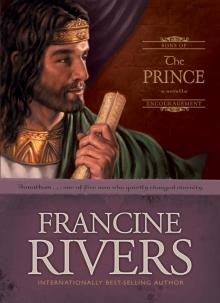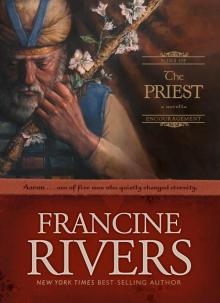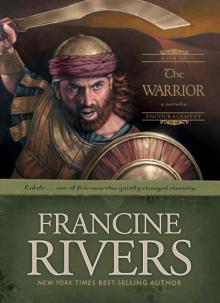- Home
- Francine Rivers
The Scribe: Silas Page 3
The Scribe: Silas Read online
Page 3
Silas put his arm over his eyes.
“Let him rest a little longer before you try to wake him. It’s only been three days, and he’s endured more than any of us. . . .”
Three days! No matter how much Silas might long to escape the sorrow of this world, he could not will himself to heaven. He reached down. The pack of precious scrolls lay beside him. His body ached as he sat up. He rubbed his face. His joints and muscles screamed as he stood. He rolled his shoulders and stretched slowly. Raising his hands in habitual praise, he prayed. “This is a day that You have made, Lord, and I will rejoice in it.” He might not feel like it, but he would do so in obedience. Grudging obedience.
Dogged, determined, he picked up the pack and followed the sound of retreating voices. He stood in the archway of a large room. Men and women of all ages sat together, enjoying a meal. Silas stayed in the shadowed corridor, studying them. He saw meat on a fine pottery platter, and fruit being passed in a simple, woven basket. Everyone had brought something to share.
A love feast.
Silas remembered the gatherings in Jerusalem, the first year after Jesus ascended, the excitement, the joy, the openhanded charity between brothers and sisters.
Jerusalem! How he longed to go home to those halcyon days.
But even if he could go back to Judea, he knew nothing would be the same. Persecution had driven the followers of Jesus to other cities and provinces, leaving behind Jewish factions that constantly warred with one another. One day, Rome would make peace for them, with the army, the way Rome always made peace. If only they would listen!
Jesus had warned of Jerusalem’s destruction. John had told Luke what Jesus said, and Luke had written it all down in the history he was collecting. The good doctor had been hard at work on it during the years Silas had known him, when they both traveled with Paul. A kind man, educated, inquisitive. A gifted physician. Paul would have died several times if not for Luke’s ministrations. And I along with him.
Had Luke escaped from Rome? Had he gone back to Corinth or Ephesus?
Timothy’s most recent letter said John was living in Ephesus. Mary, Jesus’ mother, lived with him. Her sons, James and Jude, who became believers when they saw the risen Christ, had joined the apostles on the council in Jerusalem.
“Silas!”
Startled from his reverie, Silas saw Epanetus cross the room. “Come. Join us.” Patrobas rose, as did several others.
Epanetus led Silas to a place of honor. Diana rose and prepared a plate of food for him. She smiled into his eyes when he thanked her. A young man sitting beside her whispered in her ear. “Not now, Curiatus,” she replied.
Everyone talked at once, until Epanetus laughed and raised his hands. “Quiet, everyone! Give Silas time to eat before we attack him with questions.”
They talked among themselves again, but Silas felt their glances. He gave silent thanks to God for what was placed before him. Pork, and judging by the quality, from a pig fattened in oak forests. A Roman delicacy, and unclean by Mosaic law. He took some fruit instead. Even now, after years of being freed from the Mosaic law, he had difficulty eating pork.
Others arrived—a family with several children, a young couple, two older men . . . The room filled. And each wanted to meet him, to clasp his hand.
Silas felt alone in the midst of them, trapped inside himself, captive to thoughts that buzzed like angry bees. He longed for solitude, and knew how ungrateful it would be to rise and leave them now. And where could he go other than that silent room with its rich surroundings that reminded him of things he had worked so hard to forget?
Everyone had finished eating, and he lost his appetite. He saw their expectation, felt their hunger to hear him speak.
The boy spoke first. “You knew the Lord Jesus, didn’t you?” He ignored his mother’s hand on his arm. “Would you tell us about Him?”
And then the others began. “Tell us everything, Silas.”
“What was He like?”
“How did He look?”
“What did you feel when you were in His presence?”
“And the apostles? You knew them all, didn’t you? What were they like?” The boy again, all eyes and pleading. “Will you teach us as you’ve taught others?”
Hadn’t he preached hundreds of times in dozens of towns from Jerusalem to Antioch to Thessalonica? Hadn’t he told the story of Jesus crucified and risen to small crowds and large, some praising God, others mocking and hostile? Hadn’t he worked with Timothy in teaching the Corinthians? He had traveled thousands of miles alongside Paul, establishing churches in city after city.
Yet, here among these friendly, hospitable brothers and sisters, he could think of nothing to say.
Silas looked from one face to another, trying to sort his thoughts, trying to think where to start, when all he could see in his mind’s eye was Peter hanging upside down, his blood forming a growing pool beneath him.
Everyone was looking at him, waiting, eager.
“I fear . . .” His voice broke. He felt as though someone had clamped strong hands around his throat. He swallowed convulsively and waited until the sensation passed. “I fear I endanger you.” He spoke the truth, but doubted it commended him. “Paul is beheaded; Peter crucified. The apostles are scattered, most martyred. No one can replace these great witnesses of God. No one can speak the message of Christ as effectively as they have.”
“You spoke effectively in Corinth,” Urbanus said. “Your every word pierced my heart.”
“The Holy Spirit pierces you, not I. And that was a long time ago, when I was younger and stronger than I am today.” Stronger in body; stronger in faith. His eyes blurred with tears. “A few days ago in Rome, I watched a dear friend die a horrible death because he carried the testimony of God. I don’t think I can go on. . . .”
“You were Peter’s secretary,” Patrobas said.
Leading words. They wanted to draw him out into the open.
“Yes, and my presence brings danger to all of you.”
“A danger we welcome, Silas.” The others murmured agreement with Epanetus’s firm declaration.
“Please. Teach us.” The boy spoke again.
He was not much younger than Timothy had been the first time Silas met him. Diana looked at him with her beautiful dark eyes, so full of compassion. His heart squeezed at the sight. What could he say to make them understand what he didn’t understand himself? Oh, Lord, I can’t talk about crucifixion. I can’t talk about the cross . . . not Yours or Peter’s.
He shook his head, eyes downcast. “I regret, I cannot think clearly enough to teach.” He fumbled with the pack beside him. “But I’ve brought letters.” Exact copies he had made from originals. He looked at Epanetus, desperate, appealing to him as host. “Perhaps someone here can read the letters.”
“Yes. Of course.” Smiling, Epanetus rose.
Silas took one out and, with shaking hand, presented it to the Roman.
Epanetus read one of Paul’s letters to the Corinthians. When he finished, he held the scroll for a moment before carefully rolling it and giving it back to Silas. “We have yearned for such meat as this.”
Silas carefully tucked the scroll away.
“Can we read another?” Curiatus had moved closer.
“Pick one.”
Patrobas read one of Peter’s letters. Silas had made many copies of it and sent them to many of the churches he had helped Paul start.
“Peter makes it clear you were a great help to him, Silas.”
Silas was touched by Diana’s praise, and wary because of his feelings. “The words are Peter’s.”
“Beautifully written in Greek,” Patrobas pointed out. “Hardly Peter’s native language.”
What could he say without sounding boastful? Yes, he had helped Peter refine his thoughts and put them into proper Greek. Peter had been a fisherman, working to put food on his family’s table. While Peter had toiled over his nets, Silas had sat in comfort, yoked to an exacting rabbi w
ho demanded every word of the Torah be memorized. God had chosen Peter as one of His twelve companions. And Peter had chosen Silas to be his secretary. By God’s grace and mercy, Silas had accompanied Peter and his wife on their journey to Rome. He would be forever humbled and thankful for the years he spent with them.
Though Aramaic was the common language of Judea, Silas could speak and write Hebrew and Greek as well as Latin. He spoke Egyptian enough to get by in conversation. Every day, he thanked God that he had been allowed to use what gifts he had to serve the Lord’s servants.
“What was it like to walk with Jesus?”
The boy again. Insatiable youth. So much like Timothy. “I did not travel with Him, nor was I among those He chose.”
“But you knew Him.”
“I knew of Him. Twice, I met Him and spoke with Him. I know Him now as Savior and Lord, just as you do. He abides in me, and I in Him through the Holy Spirit.” He put his hand against his chest. Lord, Lord, would I have the faith of Peter to endure if I were nailed to a cross?
“Are you all right, Silas? Are you in pain again?”
He shook his head. He was in no physical danger. Not here. Not now.
“How many of the twelve disciples did you know?”
“What were they like?”
So many questions—the same ones he’d answered countless times before in casual gatherings from Antioch to Rome.
“He knew them all,” Patrobas said into the silence. “He sat on the Jerusalem council.”
Silas forced his mind to focus. “They were strangers to me during the years Jesus preached.” Jesus’ closest companions were not people with whom Silas would have wanted contact. Fishermen, a zealot, a tax collector. He would have avoided their company, for any commerce with them would have damaged his reputation. It was only later that they became his beloved brothers. “I heard Jesus speak once near the shores of Galilee and several times at the Temple.”
Curiatus leaned forward, resting his elbows on his knees and his chin in his hands. “What was it like to be in His presence?”
“The first time I met Him, I thought He was a young rabbi wise beyond His years. But when He spoke and I looked into His eyes, I was afraid.” He shook his head, thinking back. “Not afraid. Terrified.”
“But He was kind and merciful. So we’ve been told.”
“So He is.”
“What did He look like?”
“I heard He glowed like gold and fire poured from His lips.”
“On a mountain once, Peter, James, and John saw Him transfigured, but Jesus left His glory behind and came to us as a man. I saw Him several times. There was nothing in Jesus’ physical appearance to attract people to Him. But when He spoke, He did so with the full authority of God.” Silas’s thoughts drifted to those days before He knew the Lord personally, days filled with rumors, whispered questions, while the priests gathered in tight circles, grumbling in Temple corridors. It had been their behavior most of all that sent Silas to Galilee to see for himself who this Jesus was. He had sensed their fear and later witnessed their ferocious jealousy.
Epanetus put his hand on Silas’s shoulder. “Enough, my friends. Silas is tired. And it is late.”
As the others rose, the boy pressed between two men and came to him. “Can I talk with you? Just for a little while.”
Diana reached for him, cheeks flushed, eyes full of apology. “You heard Epanetus, my son. Come. The meeting is over for the evening. Give the man rest.” She drew her son away.
“Could we come back tomorrow?”
“Later. Perhaps. After work . . .”
Curiatus glanced back. “You won’t leave, will you? You have words of truth to speak.”
“Curiatus!”
“He wrote all those scrolls, Mother. He could write all he’s seen and heard. . . .”
Diana put her arm around her son and spoke softly, but with more firmness this time, as she led him from the room.
Epanetus saw everyone safely away. When he returned, he smiled. “Curiatus is right. It would be a good thing if you would write a record.”
Silas had spent most of his life writing letters, putting down onto scrolls the encouragement and instructions of men inspired by God. The council in Jerusalem, James, Paul, Peter. “For the most part, I helped others sort and express their thoughts.”
“Would it not help you to sort your thoughts and feelings if you did? You suffer, Silas. We all can see that. You loved Peter and his wife. You loved Paul. It is never easy to lose a friend. And you’ve lost many.”
“My faith is weak.”
“Perhaps that is the best of all reasons for you to dwell on the past.” Epanetus spoke more seriously. “You have lived your life in service to others. Your ink-stained fingers are proof of it.”
The darkest part of night had come, a darkness that crushed Silas’s spirit. He looked down at his hands. They indicted him.
“Curiatus is named aptly.” Epanetus spoke gently. “But perhaps God brought you to us and put the idea in the boy’s head. Is that not possible?”
Silas closed his eyes. Can I dwell on the past without being undone by it? I regret, Lord; I regret the wasted years. Is that a sin, too?
Epanetus spread his hands. “Precious few are left who were in Judea when Jesus walked this earth.”
“That’s all too painfully true.” Silas heard his bitterness.
Epanetus sat, hands clasped, expression intense. “I will not share my story until I know you better, but know this: you are not alone in your struggle with faith. Whatever sorrow you carry other than the death of your friends is not hidden from the Lord. You know and I know Jesus died for all our sins and rose from the dead. Through faith in Him we have the promise of everlasting life. We will live forever in the presence of the Lord. But like the boy, I crave to know more about Jesus. So much of what we hear drifts away. Those scrolls, for example. Patrobas and I read two tonight. But if you leave tomorrow, how much will we all remember by next week or next month? And what of our children?”
“Another has already set about the task of writing the history: Luke, the physician.”
“I have heard of him. That’s wonderful news, Silas, but where is he now? He left Rome after Paul was beheaded, didn’t he? How long before we receive a copy of what he has written?”
“He was not the only one. Many have undertaken the task of compiling an account of things that happened and what’s been accomplished.”
“That may be so, Silas, but we have received nothing in the way of letters, other than the one written by Paul. You are here with us! We want to know what you learned from Peter and Paul. We want to see these men of faith as you did. They endured to the end. As you endure now. Share your life with us.”
“What you ask is a monumental task!” And I’m so weary, Lord. Let someone else do what he asks.
“The task is not beyond your abilities, Silas.” Epanetus gripped his arm. “Whatever you need, you have only to ask. Scrolls, ink, a safe place to write without interruption. God has blessed me with abundance so that I might bless others. Give me the blessing and honor to serve you.” The Roman stood. “May you be at peace with whatever God asks of you.”
“Epanetus!” Silas called out before he left him alone in the room. “It is not easy to look back.”
“I know.” The Roman stood in the doorway, mouth tipped. “But sometimes we must look back before we can move forward.”
* * *
TWO
* * *
Silas, a disciple of Jesus Christ, eyewitness to the Crucifixion, servant of the risen Lord and Savior, Jesus Christ, to the family of Theophilus. Grace to you and peace from God our Father and the Lord Jesus Christ.
The first time I heard the name of Jesus was in the Temple in Jerusalem. Rumors of false prophets and self-proclaimed messiahs were common in those days, and priests were often called upon to investigate. A few years earlier, Theudas had claimed to be the anointed one of God. He gained four hundred discip
les before he was slain by the Romans. The rest dispersed. Then, during the census, Judas of Galilee rose up. Soon, he too was dead and his followers scattered. My father had warned me against men who grew like weeds among wheat. “Trust in the law of Moses, my son. It is a lamp to guide your feet and a light for your path.”
John the Baptist began gathering crowds at the Jordan River, baptizing for the repentance of sins. A delegation of priests went out to question him. Upon their return, I overheard angry words in the hallowed corridors.
“He’s a false prophet who comes out of the wilderness and lives off locusts and honey.”
“The man is mad!”
“The man wears a garment of camel’s hair and a leather belt!”
“He dared call us a brood of snakes.”
“Mad or not, he has the people listening to him. And he cried out against us, asking who’d warned us against God’s coming wrath. We must do something about him!”
Something was done, but not by the priests and religious leaders. John confronted King Herod for his adulterous relationship with Herodias, his brother Philip’s wife. Arrested, he was held in the palace dungeon. Herodias held a celebration for the king’s birthday and used her daughter to entice Herod into making a foolish promise: if she would dance for his guests, he would give her whatever she wanted. The trap closed. The girl demanded John the Baptist’s head on a platter, and happily gave the gruesome gift to her scheming mother.
Those who thought John the Baptist was the Messiah grieved over his death and lost hope. Others said he pointed the way to Jesus, and went after the rabbi from Nazareth. Some, like me, waited cautiously to see what happened. All Jews lived in hope of the Messiah’s coming. We longed to see the chains of Rome broken, and our oppressors driven from the land God had given our ancestors. We wanted our nation to be great again, as it had been during the time of King David and King Solomon, his son.
Some buried their hope in the shallow grave of a false messiah only to have it arise again when a new one appeared on the horizon. Hope can be a terrible taskmaster!

 An Echo in the Darkness
An Echo in the Darkness A Lineage of Grace
A Lineage of Grace The Prince: Jonathan
The Prince: Jonathan Bridge to Haven
Bridge to Haven The Priest: Aaron
The Priest: Aaron Her Mother's Hope
Her Mother's Hope Redeeming Love
Redeeming Love The Scarlet Thread
The Scarlet Thread The Masterpiece
The Masterpiece The Last Sin Eater
The Last Sin Eater The Prophet: Amos
The Prophet: Amos As Sure as the Dawn
As Sure as the Dawn Her Daughter's Dream
Her Daughter's Dream A Voice in the Wind
A Voice in the Wind The Warrior: Caleb
The Warrior: Caleb The Scribe: Silas
The Scribe: Silas And the Shofar Blew
And the Shofar Blew The Atonement Child
The Atonement Child Unshaken_Ruth
Unshaken_Ruth Unspoken_Bathsheba
Unspoken_Bathsheba The Scribe
The Scribe Sons of Encouragement
Sons of Encouragement The Shoe Box
The Shoe Box Sycamore Hill
Sycamore Hill Unafraid_Mary
Unafraid_Mary Marta's Legacy Collection
Marta's Legacy Collection